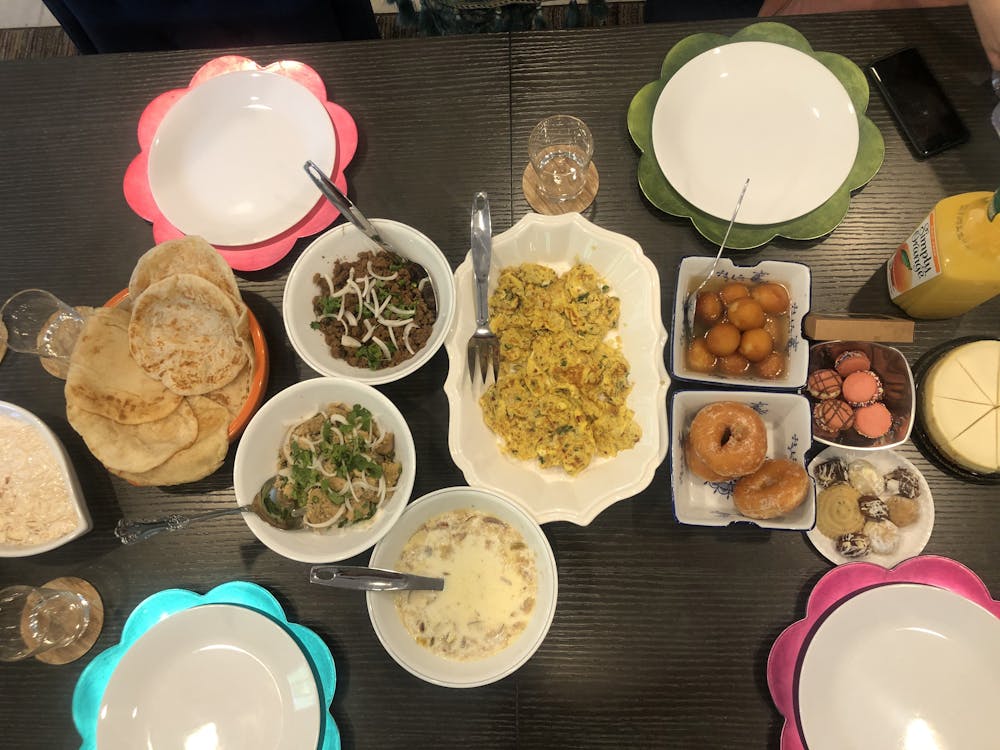In 2020 the Muslim holy month of Ramadan lasted from April 23 to May 23, largely coinciding with the outbreak of the coronavirus pandemic in the United States. The month is meant for reflection, prayer and celebration, said Miriam Haque, IU junior and Muslim Student Association president, but this year Muslims in Bloomington and across the world experienced a very different Ramadan.
Haque said that in the past several years, Ramadan has been in the summer, but this year it was going to be during the school year.
“All of us were super excited to have Ramadan together with our friends at IU — to pray together, fast together, and celebrate together,” Haque said.
Prior to the coronavirus shutdown and the cancellation of in-person classes, the MSA had planned to hold several iftars, post-sunset meals when Muslims break their fast each day during Ramadan. One would have marked the beginning of Ramadan and one would have been an interfaith meal.
Haque said her family iftars in South Bend, Indiana, begin with the traditional date, which hearkens back to the time of the Prophet Muhammad, and then continue with South Asian fried food such as pakoras, samosas and chaat, among other foods.
Eid al-Fitr, the festival of breaking the fast, is a holiday celebrated by Muslims to mark the end of Ramadan. This year the holiday began in the evening of May 23 and ended on the evening of May 24.
Mohamed Sayed, IU doctoral student and member of the judiciary board of the Islamic Center of Bloomington, said Muslims in Bloomington usually celebrate Eid by worshiping at the mosque. In past years, the ICOB mosque has had around 200 worshippers every night of Ramadan and over 500 for Eid, so many that they had to relocate to larger spaces, such as an IU gym or a public park.
After prayers are over, people stay to break their fasts, chat and hang around late into the night, and celebrations continue in smaller groups over the next couple of days, with groups meeting in parks to barbecue and exchange gifts.
But this year has been different. The mosque only allows small groups and individuals to visit, and did not hold an Eid prayer. Instead, they encouraged people to meet in small groups, with their family or neighbors, and to pray and celebrate together at home.
Likewise, the ICOB has been holding online classes, sermons and religious observations, including a class taught by Sayed on how to maintain high levels of religious practice and spirituality throughout the month of Ramadan without access to the mosque.
Following the cancellation of their in-person events, Iftikhar and Haque said that MSA members attended online hangouts and religious lectures organized by MSA branches in Ohio, Kentucky and Illinois.
Iftikhar said she feels a little sad because Eid morning prayers are typically a momentous occasion. Where she lives in Newburgh, Indiana, community members usually open their homes and bounce in between each house, eating and connecting. This year her celebration will be limited to a brunch with immediate family only, though her family was still considering dressing up and decorating to maintain a festive atmosphere.
Haque said her local mosque will be offering a Zoom Eid prayer and sermon and curbside pick-up of breakfast and goody bags for children.
Meanwhile in Bloomington, Sayed said he planned to begin his Eid with prayers with his family and a neighboring family, followed by breakfast together at IHOP and a boat trip. It is his wife and childrens’ first Ramadan in Indiana — they usually return home to Egypt for Ramadan but could not this year due to COVID-19. Sayed said that they maintained the celebratory atmosphere of Ramadan in Egypt with new clothes, decorations and a traditional Egyptian Eid cookie called kahk.
Ramadan is usually a time of increased charitable activity, as spiritual rewards for generosity are believed to be multiplied during this time. The ICOB began doing extra charitable work and fundraising a little before Ramadan, as the effects of the coronavirus pandemic began to be felt. They started an emergency assistance fund and worked to make sure that all funds were given to families in need before Eid began, Sayed said.
“In Ramadan, you want to be the best person you can be,” said Iftikhar.
By praying five times daily, sinning as little as possible, and being a little nicer to everyone for each of the 30 days of Ramadan, she said that one can make these things a habit for the rest of the year.
“This is a month for learning how to control your desires,” Sayed said.
To Sayed, this skill is all the more useful in times of global crisis.




